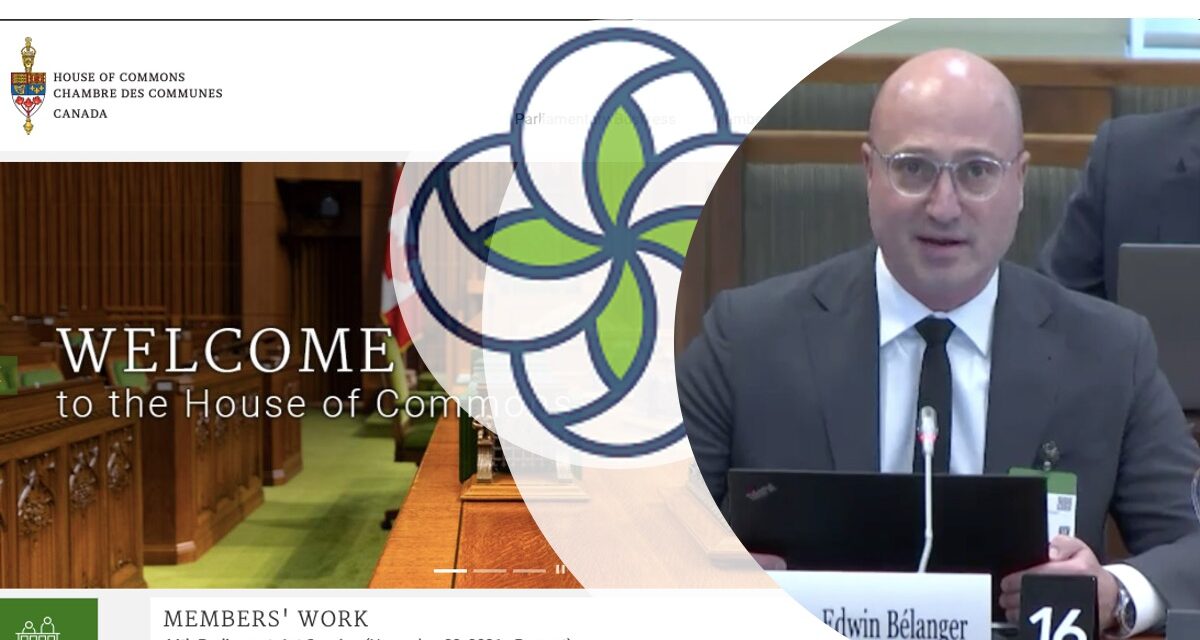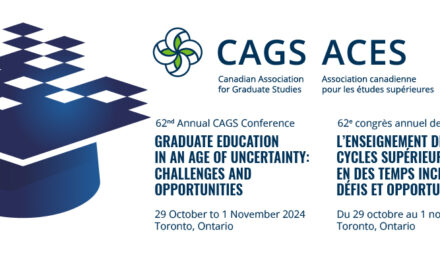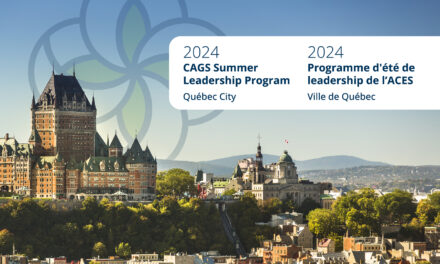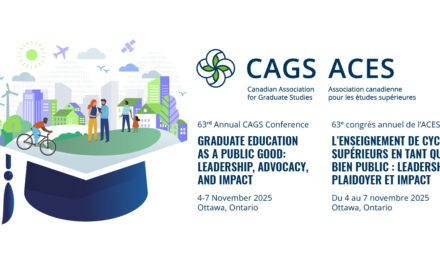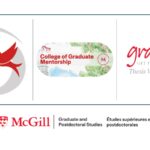House of Commons Standing Committee on Science and Research (SRSR)
The Government of Canada’s Graduate Scholarship and Post-Doctoral Fellowship Programs
That, pursuant to Standing Order 108(3)(i), the Committee undertake a study of the Government of Canada’s graduate scholarship and post-doctoral fellowship programs, in particular the freezing of funding amounts, the funding system and the impact on graduate students and post-doctoral fellows, and that it hold a minimum of six meetings on this study and report its findings to the House.
Remarks presented by M. Philippe-Edwin Bélanger,
President, Canadian Association for Graduate Studies
4 May 2023
Parliament Hill
Ottawa
Introduction
My name is Philippe-Edwin Bélanger, and I am the Directeur du Service des études supérieures et de la réussite étudiante at l’Institut national de la recherche scientifique. I address this committee today in my capacity as President of the Canadian Association for Graduate Studies.
CAGS is Canada’s national association for the advancement of excellence in graduate education, research, and scholarship. Our members consist of more than 60 Canadian universities and research institutes, as well as other stakeholders with an interest in graduate studies, including the three federal research granting agencies (NSERC; SSHRC; CIHR). CAGS’ vision is to support the formation of individuals who, through scholarship, research, innovation, and practice contribute to the flourishing of societies in Canada and around the world.
CAGS stands firm in its belief that increases to trainee funding are desperately needed across all three federal research granting agencies. The Board of Directors was disappointed by the recently released 2023 Federal Budget, and troubled by its lack of investment in the Canadian research ecosystem. CAGS members anticipated important increases in funding for faculty research grants, as well as meaningful increases to graduate student and postdoctoral scholarships.
Despite numerous calls to action from researchers and student-led coalitions over the past year, and against the recommendations of the government’s own Advisory Panel on the Federal Research Support System, the 2023 Federal Budget seemingly ignored Canadian graduate students, postdoctoral scholars, and the higher education community more broadly. This decision of not investing in current and future generations of researchers will undoubtedly hinder Canada’s ability to successfully navigate future challenges like climate change and the use of artificial intelligence, while weakening the country’s competitive edge in attracting top research talent from around the world to our universities. More critically, this persistent lack of funding will only exacerbate the financial hardship experienced by graduate students and postdocs throughout the country, with high rental costs, low vacancy rates, inflationary pressures, rising childcare expenses, and elevated food costs all contributing to the problem.
The Challenges Facing Graduate Students and Postdocs in Canada are Serious and Immediate
The funding provided by the federal government for graduate students and postdocs has been stagnant for nearly twenty years. Since 2003, when the Canada Graduate Scholarship program was created, there have been no increases in the value of the CGS-M or CGS-D awards, and no increases to the value of the postdoctoral awards since 2015. Much has changed in two decades. According to the Bank of Canada’s inflation calculator, a $17,500 Master’s scholarship awarded in 2003 would be the equivalent of $26,000 in 2023, while a $21,000 Doctoral scholarship awarded in 2003 would have a current value of $31,000. This represents a decrease in the value of CGS-M and CGS-D awards by approximately 50%.
While awards have remained stagnant at 2003 levels, the cost of tuition has increased significantly during this period. Based on the earliest data available from Statistics Canada, the national average for graduate student tuition fees in 2006 was $5,387 for domestic students and $11,100 for international students. In 2022, the national average was $7,472 per year for domestic students, and $20,120 for international students – an increase of 38% and 81% respectively.
As a result of inflation, tuition increases, and rising costs of living, the present-day value of the CGS-M, CGS-D, and Postdoctoral Scholar awards is at or below the national poverty line set by the federal government. Currently, these programs support approximately 3,000 graduate students and postdocs annually.
CAGS acknowledges that the government has put in place supplemental funding measures since 2003, notably: the 2015 increase in the number of CGS awards; the Canada Emergency Student Benefit (CESB) and Canada Research Continuity Emergency Fund (CRCEF) established in 2020; and, more recently, the targeted scholarships and fellowships for Black student researchers outlined in Budget 2022. These efforts are important and made significant contributions to fostering a culture of research in Canada. However, they do not address the central problem at hand – the decreasing value of the CGS-M, CGS-D, and PDF awards.
The Financial Insecurity Experienced by Graduate Students and Postdocs Has Significant Consequences for Canadian Society
The scholarships awarded by the federal research granting agencies are intended to support the most talented and innovative young researchers in Canada. However, for most recipients, these awards do not meet the threshold required to live with dignity and out of poverty. For example, the Institut de recherche et d’informations socio-économiques (IRIS) stated that in the province of Quebec in 2022, an individual would require at minimum between $25,128 to $34,814 per year to live. Meanwhile, the average Canadian Master’s students will have just $11,000 left from their CGS-M stipend after paying their tuition fees. Indeed, the situation has become desperate for graduate students and postdocs, with many turning to food banks to meet their basic needs. According to Alexis Diard, President of the MAGE-UQAC student association at the Université du Québec à Chicoutimi, «Pour beaucoup d’étudiants, se nourrir à la fin du mois est de plus en plus difficile…Il y a beaucoup de précarité financière chez les étudiants.»
Poor funding levels have forced the majority of graduate students and postdocs to take up jobs off-campus – working as many as 35 hours per week in addition to their studies. This is hardly a solution, as research shows that students who work off-campus increase their probability of dropping out by as much as 40%.
A comprehensive study conducted in 2016 at the Université de Montréal found that financial insecurity contributed to alarming rates of mental health issues among university students, including high rates of psychological health problems, alcohol and drug dependencies, chronic disease, and suicide. Other research demonstrates how these mental and physical health challenges are experienced in more acute ways by women, Black, Indigenous, and racialized individuals, and first generation and international students. Indeed, access to quality sources of funding remains one of the most difficult obstacles to achieving the goals of equity, diversity, and inclusion in higher education.
Calls have been made for many years to increase the number and value of scholarships for graduate students and postdocs. CAGS urged the federal government to do so in its Pre-Budget Consultation submission in 2017, and again so during the leadup to Budget 2023. In the spring of 2021, a coalition of 7,100 scientists from across Canada signed an open letter to Prime Minister Justin Trudeau and Minister François-Philippe Champagne calling for increases to NSERC scholarships and grants, in which they asserted “the Government’s inaction in supporting the scientific leaders of tomorrow is perpetuating systemic barriers” in higher education. These calls to action have since been echoed in public statements released by CAGS, Universities Canada, the U15 group, the Federation for the Humanities and Social Sciences, and ACFAS. Importantly, graduate students and postdocs have also begun to stand up and take action, including the massive Nation-Wide Walk-Out organized earlier this month by the grassroots student movement, Support Our Science.
To Address the Critical Problems Related to Research Funding in Canada, CAGS Recommends the Following Solutions
-
- A meaningful increase in the number of scholarships provided by the federal research granting agencies for graduate students and postdoctoral scholars;
- A meaningful increase in the value of scholarships provided by the tri-agencies for graduate students and postdocs;
- A meaningful increase in the number and value of faculty research grants provided by the tri-agencies to better support existing research programs and paid trainee positions.
CAGS believes that high quality, affordable, and accessible graduate education will continue to play an essential role in better understanding and tackling the complex problems that confront all Canadians. Having a well-educated population is a particularly important goal for this country, which is largely based on the knowledge economy. As we enter into this new, post-normal moment in our history, it is absolutely critical that graduate students and postdoctoral fellows – the bright, talented, and innovative researchers and leaders of the future – are well-supported and equipped.
In Conclusion
CAGS believes that high quality, affordable, and accessible graduate education will continue to play an essential role in better understanding and tackling the complex problems that confront all Canadians. Having a well-educated population is a particularly important goal for this country, which is largely based on the knowledge economy. As we enter into this new, post-normal moment in our history, it is absolutely critical that graduate students and postdoctoral fellows – the bright, talented, and innovative researchers and leaders of the future – are well-supported and equipped.
I would like to end this presentation with a quote from the sitting Minister of Innovation, Science, and Industry, The Honourable François-Philippe Champagne, who made these remarks in October 2022 in response to Petition E-4098 filed in the House of Commons on the subject of post-secondary funding: “The Government of Canada…recognizes the importance of investing in post-secondary research, and the critical role that federal scholarships and fellowships play in nurturing and sustaining Canada’s top talent through support for career progression and increased financial security and independence.”
Thank you for your time and I am pleased to answer any questions you may have.


